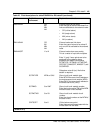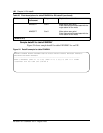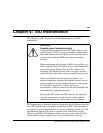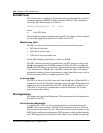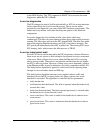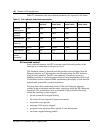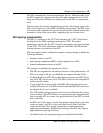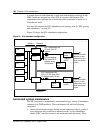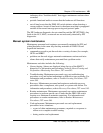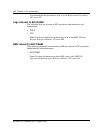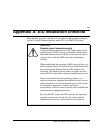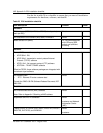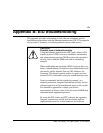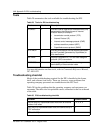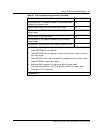
Chapter 4: EIU maintenance 109
DMS-100 Family EIU User Guide TELECOM12
indicators drive “fault thresholds” that trigger maintenance actions when
exceeded.
• periodic functional audits to ensure that the hardware still functions
• out-of-band resets that the DMS-100 switch initiates when detecting a
severe problem. An out-of-band reset is a hardware reset that is propagated
outside of the normal message processing and protocol paths.
The EIU hardware diagnostics do not extend beyond the EIP (NT9X85). Any
faults in the AUI, MAU, or network are not necessarily detected by EIU
diagnostics.
Manual system maintenance
Maintenance personnel and engineers can manually maintain the EIU and
related hardware in the same way that they maintain all DMS-100 and
SuperNode hardware:
• commands are used to put the node into a variety of states (for example,
OFFL and MBSY
• problems on the node trigger automatic maintenance actions and raise
alarms that notify maintenance personnel that a problem exists
Maintenance activities includes the following:
• Alarm clearing. Alarms are displayed along the top of the MAPCI
hierarchy. For information and procedures, refer to Alarm Clearing and
Performance Monitoring Procedures, 297-xxxx-543.
• Troubleshooting. Maintenance personnel carry out troubleshooting
procedure to try and isolate intermittent or difficult to trace problems. For
information and procedures, refer to Trouble Locating Procedures, 297-
xxxx-544.
• Recovery. Maintenance personnel and engineers undertake recovery
procedures after a component, sub-system, or system-wide failure. For
information and procedures, refer to Recovery Procedures, 297-xxxx-545.
• Routine maintenance. Maintenance personnel use routine maintenance
procedures to perform specific sets of tasks that the DMS-100 switch
requires as a minimum to maintain operations. For information and
procedures on routine maintenance, refer to Routine Maintenance
Procedures, 297-xxxx-546.
• Card replacement. Maintenance personnel use card replacement
procedures in two situations:
— as part of other maintenance procedures, required as a response to
alarms or to complete trouble locating
— during routine card replacement



